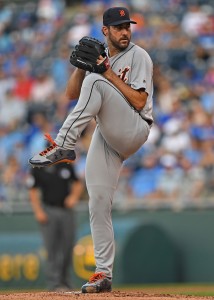11:31am: The clubs have not been in touch “for a few days” and remain “apart,” Heyman now tweets.
10:31am: The Astros remain engaged with the Tigers about a possible deal that would send star righty Justin Verlander to Houston, according to Jon Heyman of Fan Rag. Verlander has cleared revocable waivers, meaning he can be freely dealt — so long as he is willing to waive his no-trade rights.
Verlander, 34, is among the many players that have reportedly cleared waivers in recent weeks. While several organizations surely had interest in him at the trade deadline, his large contract — which includes about $7MM in remaining salary this year, $56MM in guaranteed money for the 2018 and 2019 seasons, and a 2020 vesting option — remains an evident obstacle.
Prior reports had suggested that talks between these organizations had failed to gain traction, though obviously the picture is always susceptible of change. There’s still “a decent gap” between the teams at present, Heyman adds, though it remains notable that there’s ongoing dialogue.
Even assuming Houston and Detroit can work out the money and agree upon a prospect return, there remains the wild card of the no-trade protection. It’s not clear whether Verlander would demand any consideration for accepting a deal, though there has been some discussion of that possibility — including the potential that he could seek to pick up an opt-out opportunity.
While there are obviously still significant barriers to a deal, there’s also clear motivation for both teams. The Astros will easily win their division, but their rotation has shown cracks over the course of the season and they missed on their top targets at the trade deadline. Verlander, meanwhile, has turned things around of late after a middling performance to open the year. In his last seven outings, he carries a 1.91 ERA over 47 frames, racking up a 50:16 K/BB ratio while holding opposing hitters to a paltry .187/.258/.327 batting line.
That surge has helped to boost the near-term and long-term outlook on Verlander. After showing some signs of slowing down in prior campaigns, he turned in a monster 2016 season in which he ran up a 3.04 ERA over 227 2/3 innings — though he was also aided by a .255 BABIP-against. While it’s fair to temper expectations given Verlander’s age, he is carrying a 95.7 mph average fastball velocity that sits above his career average and a 9.8% swinging-strike rate that lands just below his overall mean.
